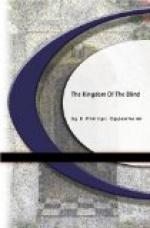“You mean to say that he was alone, talking confidentially with Hugh?” Geraldine exclaimed incredulously.
“He was, dear,” her mother assented, “and it made me think. That’s all. I have a fancy that some day when the time comes that Hugh is free to talk, he will be able to interest you—well, quite as much as Captain Granet. . . . Now then, dear, hurry. There’s the car at the door for you and you haven’t your hat on.”
Geraldine went upstairs a little thoughtfully. As she drew on her gloves, she looked down at the empty space upon her third finger. For a moment there was almost a lump in her throat.
CHAPTER XVI
The two men who had walked up together arm in arm from Downing Street, stood for several moments in Pall Mall before separating. The pressman who was passing yearned for the sunlight in his camera. One of the greatest financiers of the city in close confabulation with Mr. Gordon Jones, the Chancellor of the Exchequer, was an interesting, almost an historical sight.
“It is a source of the greatest satisfaction to me, Sir Alfred,” the Minister was saying earnestly, “to find such royal and whole-hearted support in the city. I am afraid,” he went on, with a little twinkle in his eyes, “that there are times when I have scarcely been popular in financial circles.”
“We have hated you like poison,” the other assured him, with emphasis.
“The capitalists must always hate the man who tries to make wealth pay its just share in the support of the Empire,” Mr. Gordon Jones remarked. “The more one has, the less one likes to part with it. However, those days have passed. You bankers have made my task easier at every turn. You have met me in every possible way. To you personally, Sir Alfred, I feel that some day I shall have to express my thanks—my thanks and the thanks of the nation—in a more tangible form.”
“You are very kind,” the banker acknowledged. “Times like this change everything. We remember only that we are Englishmen.”
The Minister hailed a passing taxi and disappeared. The banker strolled slowly along Pall Mall and passed through the portals of an august-looking club. The hall-porter relieved him of his coat and hat with great deference. As he was crossing the hall, after having exchanged greetings with several friends, he came face to face with Surgeon-Major Thomson. The latter paused.
“I am afraid you don’t remember me, Sir Alfred,” he said, “but I have been hoping for an opportunity of thanking you personally for the six ambulance cars you have endowed. I am Surgeon-Major Thomson, chief inspector of Field Hospitals.”
Sir Alfred held out his hand affably.
“I remember you perfectly, Major,” he declared. “I am very glad that my gift is acceptable. Anything one can do to lessen the suffering of those who are fighting our battle, is almost a charge upon our means.”




